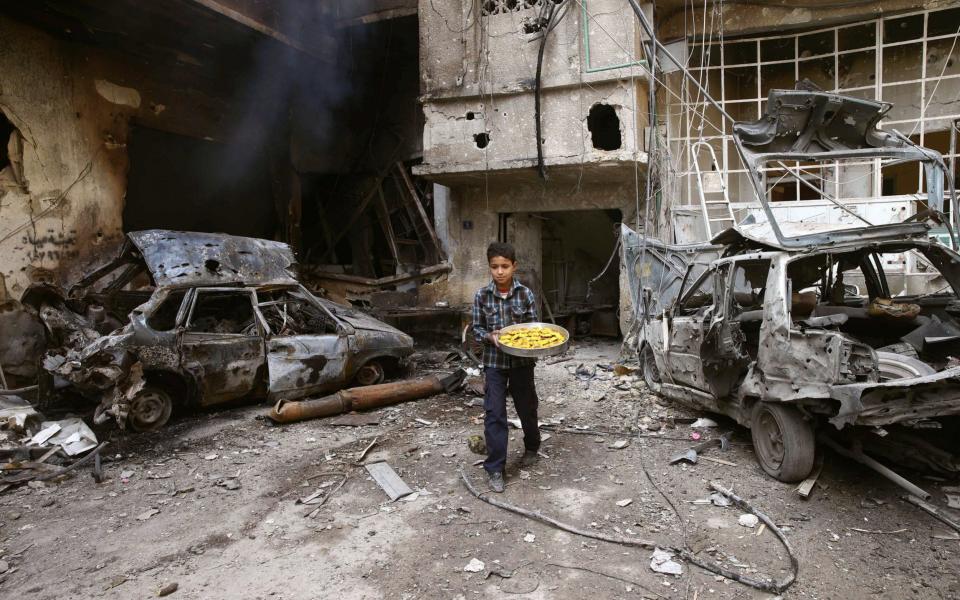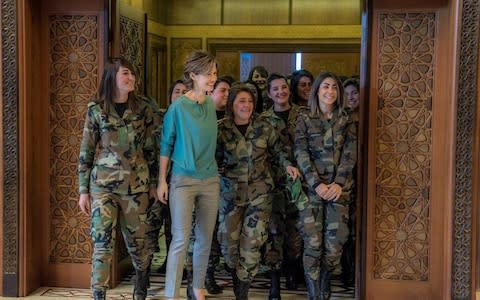Rebels in part of besieged Syrian enclave agree to withdraw

Syrian rebels in one of the besieged Eastern Ghouta pockets have agreed to withdraw, under a deal which will put pressure on remaining rebels to surrender.
Fighters from the Ahrar al-Sham rebel group in control of the town of Harasta had agreed to lay down arms in return for safe passage to opposition-held northwestern Syria and an offer to be pardoned under reconciliation terms with the authorities for those who want to stay
Some 1,500 militants and 6,000 of their family members will be transported to Idlib province in two batches starting on Thursday, according to Lebanese militia and regime ally Hizbollah, which helped broker the deal alongside Russia.
Idlib has become something of a holding pen for thousands of rebels who surrendered in Aleppo and more recently Eastern Ghouta. More extreme jihadists now control the city, having overpowered more moderate Free Syria Army elements.

If the two other main rebel groups in Ghouta - Failaq al-Rahman in the southern pocket and Jaish al-Islam in the northern - surrender, it would see the entire enclave fall.
The Syrian army and allied forces have recaptured 70 percent of the territory that was under insurgent control in the enclave and after weeks of bombardment residents are fleeing by the thousands.
However, some of the most densely populated urban areas, such as Harasta and Douma, remain under opposition control.
Idlib, where the rebels will be send under the deal, is home to some 2.5 million people. It is one of the “de-escalation zones” in Syria, yet the regime has continued its bombing campaign there. Residents fear Assad’s troops will focus their attention on the city after their assault on Ghouta.
As well as opposition rebels, the government has also relocated jihadists to Idlib. Extremists are now said to control the city, having overpowered more moderate Free Syria Army elements.
The beleaguered rebels fired a mortar into government-held Damascus on Tuesday, killing 38 people in a market, making it one of the deadliest attacks in the capital since the start of the seven-year civil war.
Videos of the aftermath of the attack posted online showed scenes of chaos, with people screaming and bodies and mannequins strewn across the ground.

The Bashar al-Assad regime has used everything in its arsenal to try to force the rebels in Eastern Ghouta, which has been under siege for five years, to surrender.
The government has been increasingly attacked civilian areas with chemical weapons, according to experts.
Chemical agents, predominantly chlorine, were reportedly used against the opposition in Ghouta on at least 15 occasions in January and February, compared to just 10 recorded incidents in the entire fourth quarter of 2017, according to IHS Markit analysts.
The US had previously stated that its “red line” is the use of agents banned under the Chemical Weapons Convention, which include sarin, but not chlorine due to its dual commercial use.
There have been increasing signals in recent weeks to suggest that a case for action is being built by the US, UK and France against the Syrian government for its use of chemical agents.
“The US probably calculates that weakening President Assad’s military capabilities while Turkey secures the opposition-held areas in northern Syria would force him to abandon his stated aim of achieving all-out military victory, and enter into meaningful negotiations,” said Columb Strack, Middle East analyst at IHS Markit.

 Yahoo News
Yahoo News 